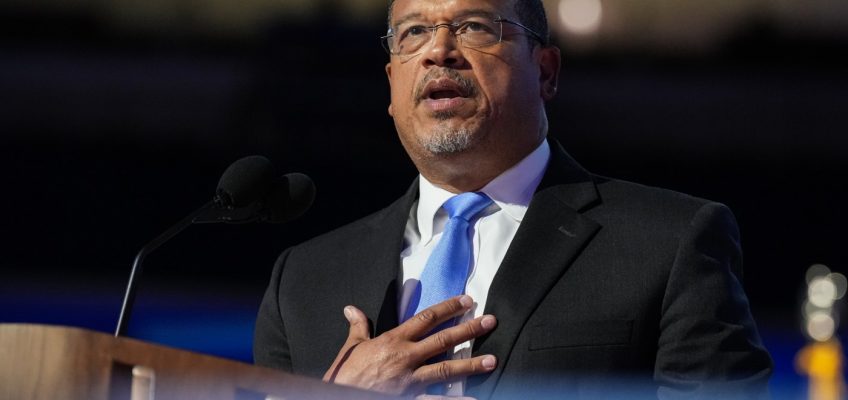By JILL COLVIN
NEW YORK (AP) — President-elect Donald Trump is threatening to impose sweeping new tariffs on Mexico, Canada and China as soon as he takes office as part of his efforts to crack down on illegal immigration and drugs.
The tariffs, if implemented, could dramatically raise prices on everything from gas to automobiles. The U.S. is the largest importer of goods in the world, with Mexico, China and Canada its top three suppliers, according to the most recent Census data.
Trump made the threats in a pair of posts on his Truth Social site Monday evening in which he railed against an influx of illegal migrants, even though southern border crossings have been hovering at a four-year low.
“On January 20th, as one of my many first Executive Orders, I will sign all necessary documents to charge Mexico and Canada a 25% Tariff on ALL products coming into the United States, and its ridiculous Open Borders,” he wrote, complaining that “thousands of people are pouring through Mexico and Canada, bringing Crime and Drugs at levels never seen before,” even though violent crime is down from pandemic highs.
He said the new tariffs would remain in place “until such time as Drugs, in particular Fentanyl, and all Illegal Aliens stop this Invasion of our Country! ”
Trump also turned his ire to China, saying he has “had many talks with China about the massive amounts of drugs, in particular Fentanyl, being sent into the United States – But to no avail.”
FILE – President-elect Donald Trump speaks at meeting of the House GOP conference, Nov. 13, 2024, in Washington. (AP Photo/Alex Brandon, File)
“Until such time as they stop, we will be charging China an additional 10% Tariff, above any additional Tariffs, on all of their many products coming into the United States of America,” he wrote.
It is unclear whether Trump will actually go through with the threats or if he is using them as a negotiating tactic before he takes office in the new year.
Arrests for illegally crossing the border from Mexico have been falling and remained around four-year lows in October, according to the most recent U.S. numbers
The Border Patrol made 56,530 arrests in October, less than one third of the tally from last October.
Much of America’s fentanyl is smuggled from Mexico. Border seizures of the drug rose sharply under President Joe Biden, and U.S. officials tallied about 21,900 pounds (12,247 kilograms) of fentanyl seized in the 2024 government budget year, compared with 2,545 pounds (1,154 kilograms) in 2019, when Trump was president.
Trump’s nominee for treasury secretary, Scott Bessent, if confirmed, would be one of several officials responsible for imposing tariffs on other nations. He has on several occasions said tariffs are a means of negotiation with other countries.
He wrote in a Fox News op-ed last week, before his nomination, that tariffs are “a useful tool for achieving the president’s foreign policy objectives. Whether it is getting allies to spend more on their own defense, opening foreign markets to U.S. exports, securing cooperation on ending illegal immigration and interdicting fentanyl trafficking, or deterring military aggression, tariffs can play a central role.”
If Trump were to move forward with the threatened tariffs, the new taxes would pose an enormous challenge for the economies of Canada and Mexico, in particular.
They would also throw into doubt the reliability of the 2020 trade deal brokered in large part by Trump, which is up for review in 2026.
Related Articles
After Trump’s win, Black women are rethinking their role as America’s reliable political organizers
Special counsel moves to abandon election interference, classified documents cases against Trump
Joe Biden begins final White House holiday season with turkey pardons for ‘Peach’ and ‘Blossom’
Donald Trump Jr. emerges as a political force of his own as he helps his father launch a second term
TV’s Dr. Oz invested in businesses regulated by agency Trump wants him to lead
Spokespeople for Canada’s ambassador to Washington and its deputy prime minister, Chrystia Freeland, who chairs a special Cabinet committee on Canada-U.S. relations to address concerns about another Trump presidency, did not immediately provide comment.
Trump’s promise to launch a mass deportation effort is a top focus for the Cabinet committee, Freeland has said.
A senior Canadian official had said before Trump’s posts that Canadian officials are expecting Trump to issue executive orders on trade and the border as soon as he assumes office. The official was not authorized to speak publicly and spoke on condition of anonymity.
Mexico’s Foreign Relations Department and Economy Department also had no immediate reaction to Trump’s statements. Normally such weighty issues are handled by the president at her morning press briefings.
Associated Press writers Adriana Gomez Licon in Fort Lauderdale, Florida, Robert Gillies in Toronto, Mark Stevenson in Mexico City, Fatima Hussein and Josh Boak in Washington contributed to this report.




